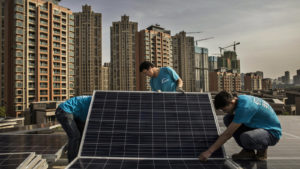Commentary: Trump cedes green energy jobs and leadership to China

By Raja Krishnamoorthi
December 11, 2017, 10:25 AM
Recently, Syria announced it would be joining the Paris climate accord. In the wake of President Donald Trump’s decision to withdraw from the accord, the United States is now the only nation on Earth that is not part of the effort to combat climate change. Beyond the enormous environmental consequences of this decision there are also economic ones: Through abandoning the commitments we made in the Paris climate accord and similar policies, we have abandoned our leadership of the green economy, with all its rewards, to China.
As the former president of a small solar energy company in Chicago’s suburbs, I know the huge potential the renewable energy sector holds for creating good-paying American jobs, especially here in Illinois. Already, the U.S. solar industry is creating such jobs 12 times faster than the economy overall. And that trend is growing. The Bureau of Labor Statistics recently released its projections for U.S. employment in 2026. The two fastest-growing occupations are solar photovoltaic installers and wind turbine service technicians.
Unsurprisingly, the Chinese have recognized that green energy will provide millions of jobs in the future. That’s why they are heavily promoting development of their renewable fuels sector — not just as assemblers, but also as innovators. The Chinese government has invested vast sums in research and development for solar cells, solar panels and solar technology as well as the various subsystems to deliver that power. It heavily promotes startup companies to sell these innovations in domestic and overseas markets.
And it’s working. Of the 8.1 million renewable energy jobs that exist around the world today, 3.5 million are in China, and fewer than 1 million in the U.S. Five of the six largest solar-module manufacturing firms in the world are Chinese. In short, China’s renewable energy sector is eating our lunch.
Most Americans are reluctant to have government attempt to pick industry winners and losers — and I agree. The market should drive these kinds of economic choices. Over the past few years, it has. Investments in renewable energy have become far more competitive in relation to fossil fuels such as oil. And that’s despite huge federal tax subsidies for fossil fuels, such as the oil depletion allowance.
If we want the United States to be serious about our green economy, there are several steps we can take to recapture the lead in this growing field. Congress can make it easier for state and local governments to finance green projects by expanding the use of community bonds geared toward renewable resources. We can also make sure that any infrastructure investment ensures that federal dollars are invested in projects that will provide a return to our economy and our planet.
And most important, when considering tax reform, Congress cannot cut important programs like the Research and Development Tax Credit. The tax credit allows companies to take risks and push boundaries in new fields. Whether it’s a new solar cell that can get more energy per photon or a new turbine blade that allows windmills to be shrunk onto every rooftop, we need to make sure the United States is at the leading edge of the green economy.
Illinois is well positioned to gain from the growth of the solar industry. Our state benefits from a large concentration of physicists who could make us a hotbed of innovation in semiconductors — the heart of solar technology. With nearly 700 resident physicists, we rank eighth in the country and tops by far among the Midwest states. And our pipeline is growing. In 2015, the University of Illinois at Urbana-Champaign and the University of Chicago turned out more than 100 physics grads, while the University of Illinois-Chicago and Illinois Institute of Technology each added another 30. Unfortunately, through withdrawing from the Paris climate accord and his other energy policies, President Trump is attempting to pick winners — favoring declining resources over the growing market for renewables.
Through recklessly withdrawing our nation from the Paris accord, whose voluntary guidelines on carbon emissions would help grow our renewable energy sector, Trump has signaled to the world that America is not committed to clean energy. At the cost of clean air and a healthy environment, the president is rolling back dozens of rules designed to reduce carbon emissions. And he is opening up millions of acres of public land to fossil fuel exploration, including our coastal waters and the Arctic National Wildlife Reserve.
While President Trump talks tough on trade and lost jobs during his trip to Asia, his reckless energy policies are serving up green energy jobs and innovation to our Chinese competitors — on a silver platter.
Raja Krishnamoorthi, D-Schaumburg, represents the 8th Congressional District of Illinois, which includes Chicago’s west and northwest suburbs.
